Trump and North Korea talks: The political gamble of the 21st Century
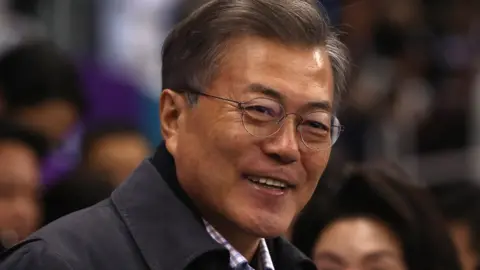 Getty Images
Getty ImagesSouth Korean leader Moon Jae-in is either a diplomatic genius or a communist set on destroying his country and US President Donald Trump is either a master of brinkmanship or a pawn in a more devious game - depending on who you speak to.
But it is the other actor in this saga, Kim Jong-un, the only one who has yet to make a direct statement, who may just be the most significant player in this most extraordinary of political gambles.
From the moment he extended an apparent olive branch to the South in his new year message to the cordial delegations to Pyeongchang for the Winter Olympics, it became clear that Kim Jong-un had mastered the most sophisticated crafts of propaganda.
Some will view his personal invitation to Mr Trump to hold talks with him - as well as the commitment to freeze further nuclear tests - as the real diplomatic masterstroke after a year that was unprecedented for the level of naked hostility the US and the North bared toward one another.
But the risk here belongs to both Moon Jae-in and Donald Trump. In a situation where neither can claim sole mastery of the narrative, without a clear exit strategy, and when there are so many definitions for both success and failure, a lot is at stake.
Whose charm offensive?
Mr Moon is viewed by his supporters as the negotiator-in-chief who has now skilfully managed to get Mr Kim to at least talk about getting rid of nuclear weapons.
He is the one who spotted the opportunity during the North Korean leader's speech in January - which offered a glimmer of hope that the reclusive state was willing to engage with the South - and grabbed it with both hands.
The dizzying level of diplomacy and a frenzy of visits between North and South has now delivered - it seems.
"People are calling this the North Korean charm offensive, I actually think this is a South Korean charm offensive. This is something President Moon Jae-in clearly wanted," John Delury from Yonsei University said to me even before the talks were announced.
Mr Moon knew his envoys would have to extract the word "denuclearisation" from Mr Kim when they visited Pyongyang. He also knew having two of his top level government ministers looking cosy with the North Korean leader would not go down well in Washington or Tokyo.
But it was worth the risk. The US would not have considered talking to the communist state without that meeting. His chosen delegates got what they needed.
The South Korean leader is also attempting the role of honest broker, handling Mr Trump and Mr Kim at the same time. He is choosing his words carefully and keeping his cards close to his chest while flattering those who respond to the spotlight.
In his New Year's address he said Mr Trump deserved "huge credit" for talks between the two Koreas, knowing it would please him. He is also using language that will reassure a concerned Republican administration. The language of the South Korean statement announcing the talks was also fulsome in its admiration for Trump's handling of the situation leading up to this moment.
Sanctions will stay in place, Mr Moon had said earlier, and Mr Trump has now confirmed that.
Manipulated by North Korea?
But everybody knows it wasn't always like that. Just six months ago Mr Trump was promising to rain down "fire and fury like the world has never seen" on North Korea if it dare threaten the US. Prof Haksoon Paik, lead researcher at the Sejong Institute, said that threat level felt "totally unprecedented".
"President Moon was very much concerned about nuclear threat of war. Kim Jong-un was in the same situation. We were hearing from the likes of the US Senator Lindsay Graham that lives will be lost over here. Donald Trump's unorthodox and unstable leadership had both Korean leaders worried about the potential of military options."
The US has always maintained that the permanent denuclearisation of North Korea is the endgame. Even with all the surprises up to this point, few believe Mr Kim would agree to that so if they don't achieve that what options does Trump have?
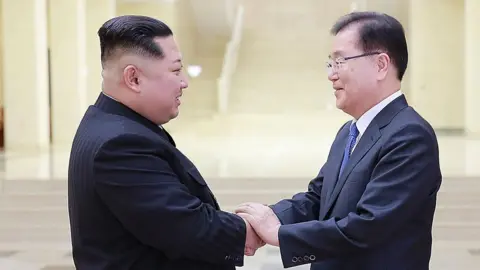 Getty Images
Getty ImagesSo is Moon Jae-in - and indeed Donald Trump - being manipulated by a North Korea which has fooled the world before?
"By dangling before the US once again 'denuclearization of the Korean peninsula' and 'moratorium on nuclear and missile tests', Kim seeks to weaken sanctions, pre-empt US military pre-emption, and condition the world into accepting North Korea as a legitimate nuclear state," says Prof Lee Sung-yoon from the Fletcher School of Law and Diplomacy, Tufts University.
For Mr Trump this could be about one of the boldest and most historic moves a US leader has made in foreign relations.
If this gamble works out, Mr Trump could credit himself as the president who sorted out North Korea. His administration has had very few victories, despite promising his voters there would "so much winning."
He believes his "maximum pressure" strategy and his work to get China on side and help squeeze Pyongyang economically is working.
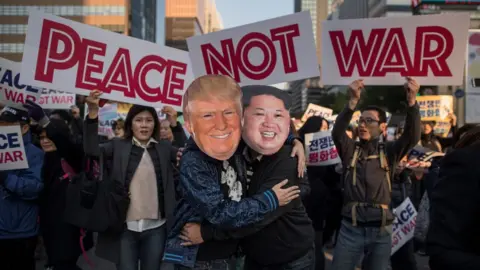 Ed Jones/Getty
Ed Jones/GettyReporters say he casually mentioned in the White House briefing room that he hoped they would give him credit for Kim Jong-un's offer. His voters certainly will.
But meeting Mr Kim risks treating the communist leader as an equal. It could be a PR disaster. The date set is also only a few months away - a short time frame to achieve diplomatic goals with a leader he mocked as "little rocket man" just a few months ago.
Prof Robert E Kelly at Busan University in South Korea tweeted: "Trump doesn't study or even read. He tends to fly wildly off script. And May means there's almost no time for all the staff prep necessary."
Pyongyang has been playing this game for decades. Mr Trump is new to it. He may see a big win on the horizon, but his Art of the Deal book will not be the guide he needs to deal with Kim Jong-un.
Politics is personal
For Mr Moon this is about history and it is also personal.
He played a part in previous attempts to negotiate with North Korea as chief of staff to President Roh Moo-hyun when he met Mr Kim's father, Kim Jong-il, in 2007. That was the last time the leaders of the two Koreas held a summit. A satellite launch by Pyongyang ended the talks.
By then around $4.5bn of aid had been sent North during the policy of engagement. Critics believe that money helped to accelerate the weapons programme.
Having failed once before, Mr Moon is trying to complete the work he started, says Duyeon Kim, a senior fellow at the Korean Peninsula Forum.
"He's basically following the same playbook as his two liberal predecessors. It's exactly the kind of thing he would want to pick up and continue."
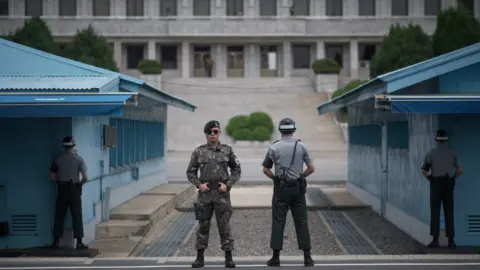 Getty Images
Getty ImagesAs a son of refugees from the North, Mr Moon is also aware of the effects of conflict on the peninsula. His parents fled North Korea aboard a UN supply ship in 1950 at the start of the Korean War alongside thousands of other refugees.
He told reporters during his election campaign: "My father fled from the North, hating communism. I myself hate the communist North Korean system. That doesn't mean I should let the people in the North suffer under an oppressive regime."
President Moon has acknowledged there are obstacles ahead. He is managing expectations and so much can go wrong.
Duyeon Kim believes there is a high probability that at the end of this negotiating process, all parties will fail, and North Korea will decide it wants to keep its nuclear weapons. And yet...
"You just don't know. I don't think it's ever a lost cause, in spite of all the doubts and scepticism all parties should go in with clear eyes, but negotiate hard."
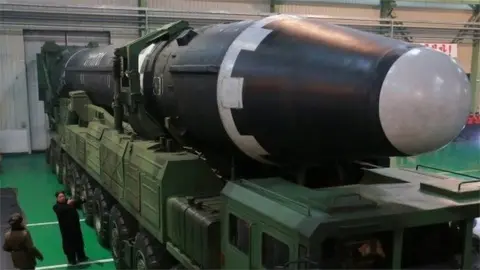 Reuters
ReutersPresident Moon's approval ratings took a hit during the Winter Olympics after he integrated the women's hockey team with players from the North and met a general from Pyongyang who had been accused of masterminding deadly attacks on South Koreans, though they have since rebounded.
He may suffer politically if this fails but maybe for him, this is not about scoring political points. This is what he told Time magazine last year when he was presidential candidate: "My mother is the only one [of her family] who fled to the South. [She] is 90 years old. Her younger sister is still in the North alive. My mother's last wish is to see her again."
These talks are a huge gamble with a communist state which is hard to read.
But if, just if, he helps pull it off it may reduce the threat of nuclear war and he could win himself a Nobel peace prize.
If all fails, it is back to brinkmanship.
